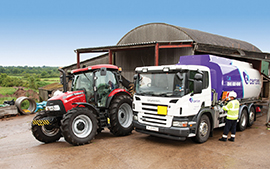Whether you’re busy out on the fields or have your hands full taking care of livestock, keeping track of fuel levels on a farm can often fall to the bottom of a packed ‘to do’ list. But running out of fuel for your farm can be disastrous, leading to machinery being parked up and operations grinding to a complete halt.
There are a number of different ways to prevent your fuel tank from running dry, make fuel go further, and ensure a reliable supply when your farm needs it most.
Here are our top tips to keep your farm fully fuelled throughout the year.
Tanks a lot
With time in short supply, many farmers have introduced telemetry monitoring systems to their tanks to ensure that they never run out of fuel. Telemetry systems track fuel within a tank and trigger an automatic fuel delivery when stocks dip below a set level. At Fairfields Farm, telemetry helped take the stress out of fuel management during the harvest season.
Robert Strathern, owner of Fairfields Farm Crisps commented: “The telemetry system has given us one less thing to manage on the farm as I know fuel levels are constantly being monitored so I don’t need to worry about taking time to place an order. It’s exactly the kind of service farmers need from a fuel provider.” Read the full case study here.
Prepare for FAME
Keeping your farm topped up with fuel means keeping your bulk supply in peak condition. However, an increase of renewable content – particularly FAME, a type of biofuel – in fuels, as required by law under the Renewable Transport Fuel Obligation (RTFO), can have an impact on fuel shelf life, performance and consumption.
Reports from farmers across the UK experiencing filter blockages in vehicles and fuel storage tanks have coincided with this increase of bio content in red diesel. FAME-containing fuels absorb and retain moisture at a higher rate than conventional mineral diesels. And when it comes to fuel, higher water content can cause severe disruption.
When the weather gets warmer, greater humidity paired with high water content may lead to an increase in microbial growth – also known as diesel bug – in storage tanks. And when the bug bites, the consequences can be serious – blocking filters, corroding tanks and – in some cases – damaging machinery. In winter, lower temperatures and higher moisture levels can cause the formation of wax crystals, resulting in fuel flow problems that can stop farm vehicles from even starting at all.
Making fuel go further
There are a number of measures you can take to protect your farm’s fuel supply from issues caused by FAME. Diesel additives like Anti-Bug and Anti-Wax can help remedy microbial growth and prevent the formation of wax crystals in a farm’s bulk fuel supply.
FAME-free fuels are also available to stop the problem at its source. Cleaner burning diesel alternatives such as GTL Fuel have zero biological content; can be used as an immediate replacement for diesel; and are approved by John Deere and a number of other OEMs for use in farm vehicles and machinery.
Work with a trusted local supplier
A reliable supply of road diesel, red diesel and heating oil is the lifeblood of a farm. But with demand shifting across the seasons – from the activity boom of harvest to the relative lull of winter preparation – having a fuel supplier in place that understands your needs is key.
Our specialist local teams work closely with your farm to provide bespoke solutions that meet your changing seasonal requirements, with dedicated account managers on hand 24/7 to keep your farm moving during the busiest times of year.
To ensure a dependable fuel supply, our national network of 130 depots and 900 tankers deliver fuel promptly and punctually – whenever and wherever it is needed. We’re also proud to partner with farming buying groups to deliver a competitive, reliable service to farms across the country.
Discover how Certas Energy can keep you fuelled up all year round for a productive and profitable farm.
Download our agriculture brochure here.








